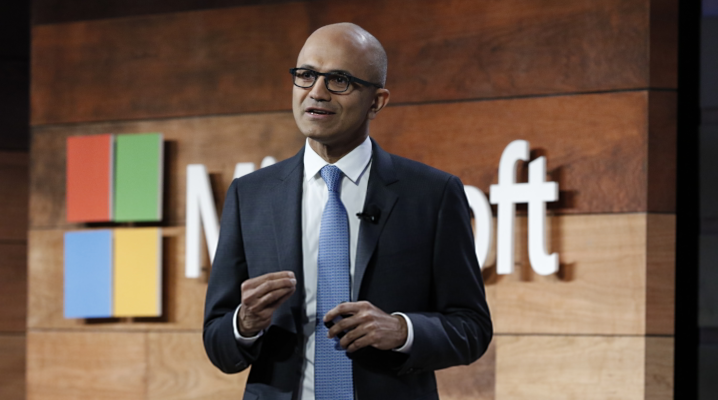 CLOUD
CLOUD
 CLOUD
CLOUD
 CLOUD
CLOUD
Microsoft Corp. rode strong cloud performance to better-than-expected financial results in its fiscal third quarter today, with enterprise spending on artificial intelligence playing an increasingly important role in cloud growth.
Revenue rose 17%, to $61.86 billion, eclipsing analysts’ estimates by nearly $1 billion. Net income of $21.9 billion, or $2.94 per share, also came in well ahead of consensus estimates of $2.84 per share, up 20% year-over-year.
That’s despite the fact that Microsoft increased capital expenditures to $14 billion in the quarter from $11.5 billion the previous quarter. Much of that was to prepare for the surge of AI-related training and inferencing business.
The closely watched Microsoft cloud revenue hit $35.1 billion, up 23%. The intelligent cloud segment, which consists of public, private and hybrid server products and cloud services, rose 21%, to $26.71 billion.
Sales in the Productivity and Business Processes segment grew 11% to $19.6 billion in constant currency, with Office Commercial products and cloud services revenue increasing by 12% and Office 365 Commercial revenue growing by 15%. The company counted 80.8 million Microsoft 365 subscribers at the end of the quarter.
Investors who had sent Microsoft shares down more than 6% over the past two weeks cheered the results, bidding the stock up more than 4% after-hours.
Microsoft said more than 65% of Fortune 500 companies now use its Azure OpenAI service based on OpenAI generative pretrained transformer technology. The company has recently branched out with its own small language models that can fit inside a smartphone and a set of AI accelerator processors for use in Azure.
Cloud continues to be the company’s engine of growth, fueled in part by hybrid and multicloud offerings. According to Chief Executive Satya Nadella (pictured), Azure Arc, which enables administrators to manage on-premises and cloud services from a single console, has now been adopted by 33,000 customers, double the number a year ago.
“We are the hyperscale platform of choice for SAP and Oracle workloads,” he said. “We are seeing an acceleration in the number of large Azure deals from leaders across industries.”
Microsoft said the number of $100 million-plus Azure deals increased over 80% year-over-year, while the number of $10 million-plus deals more than doubled. The Fabric integrated data analytics platform has accumulated over 11,000 paying customers in just one year.
Although executives spent much of the earnings call with analysts discussing the potential of AI copilots, the technology remains in the early stages. Microsoft said AI contributed 7% of the 23% growth in cloud revenues, up from 6% the previous quarter.
“Clearly, the drivers of revenue growth are infrastructure and cloud,” said Alexander Wurm, a senior analyst at Nucleus Research Inc. “Microsoft wants you to focus on AI, but what we’re seeing in interactions with customers in that AI adoption is in the very early stages. Anything meaningful for their bottom line is coming on the infrastructure side.”
Nevertheless, officials clearly see copilots as a competitive leverage point. “The way Office was traditionally used for knowledge work was to support processes,” Nadella said. “Now, we have the ability to essentially bridge the work artifacts inside of these knowledge tools with workflow and the business process data. Our copilot has the ability to integrate with SAP, Salesforce, ServiceNow and Dynamics. We’re building a copilot that’s an orchestrator of other copilots.”
That argument didn’t persuade Nucleus’ Wurm. “They were first to market with a lot of copilots, but the companies that are best able to use metadata on how their products are used will be able to deliver the best service,” he said. “In the long run, we could see another vendor offering a strong copilot that works with Microsoft to improve the deliverable.”
However, Wurm said the productivity-enhancing power of copilots shouldn’t be underestimated. His firm’s studies have found that a 10-minute reduction in an average sales transaction can translate into $10 million in savings at a large enterprise. “The scale to which AI can save time and improve user efficiency is tremendous,” he said.
Microsoft officials said the company is taking market share away from cloud computing rivals but didn’t provide specifics. A rising tide is lifting all boats in the current AI-fueled market frenzy.
Microsoft said it expects to see relatively little impact from currency exchange rates and solid growth in commercial bookings. Capital expenditures will continue to grow. “Currently, near-term AI demand is a bit higher than our available capacity,” said Chief Financial Officer Amy Hood.
Intelligent Cloud revenue is expected to grow between 19% and 20% in the next quarter with Azure growth coming in at about 30%. The company didn’t forecast fourth-quarter revenue but said it expects full-year fiscal 2024 operating margins to be up over 2% despite the significant cloud and AI investments it has been making.
THANK YOU